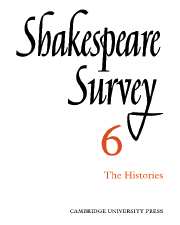Book contents
- Frontmatter
- Shakespeare's History plays: 1900-1951
- The Unity of 2 Henry IV
- Anticipation and Foreboding in Shakespeare’s Early Histories
- Middle-Class Attitudes in Shakespeare’s Histories
- A Reconsideration of Edward III
- On Producing Henry VI
- The Huntington Library
- An Early Elizabethan Playhouse
- Shakespeare Learns the Value of Money: The Dramatist at Work on Timon of Athens
- Shakespeare’s French Fruits
- An Elizabethan Eyewitness of Antony and Cleopatra?
- Othello’s “It is the cause . . .”: An Analysis
- On Translating Hamlet
- Shakespeare in China
- International Notes
- Shakespeare Productions in the United Kingdom: 1951
- Shakespeare’s History Plays - Epic or Drama?
- Festival Shakespeare in the West End
- The Year's Contributions to Shakespearian Study 1 Critical Studies
- 2 Shakespeare’s Life, Times and Stage
- 3 Textual Studies
- Books Received
- Index
- Plate Section
An Early Elizabethan Playhouse
Published online by Cambridge University Press: 28 March 2007
- Frontmatter
- Shakespeare's History plays: 1900-1951
- The Unity of 2 Henry IV
- Anticipation and Foreboding in Shakespeare’s Early Histories
- Middle-Class Attitudes in Shakespeare’s Histories
- A Reconsideration of Edward III
- On Producing Henry VI
- The Huntington Library
- An Early Elizabethan Playhouse
- Shakespeare Learns the Value of Money: The Dramatist at Work on Timon of Athens
- Shakespeare’s French Fruits
- An Elizabethan Eyewitness of Antony and Cleopatra?
- Othello’s “It is the cause . . .”: An Analysis
- On Translating Hamlet
- Shakespeare in China
- International Notes
- Shakespeare Productions in the United Kingdom: 1951
- Shakespeare’s History Plays - Epic or Drama?
- Festival Shakespeare in the West End
- The Year's Contributions to Shakespearian Study 1 Critical Studies
- 2 Shakespeare’s Life, Times and Stage
- 3 Textual Studies
- Books Received
- Index
- Plate Section
Summary
Our knowledge of the drama during the early years of Queen Elizabeth is fragmentary. We know the names of a few playwrights; a certain number of plays have been preserved; some actors are known; and we have the names and locations of a few early playhouses such as the Saracen’s Head in Islington and the Boar’s Head in Aldgate. In spite of this insufficient knowledge we can be reasonably certain that there was a great deal of theatrical activity during the middle years of the century, and the following passage written by John Strype in 1720 well describes the growth and development of the drama during the years in question.
In those former Days, ingenious Tradesmen and Gentlemens Servants would sometimes gather a Company of themselves, and learn Interludes, to expose Vice, or to represent the Noble Actions of our Ancestors in former Times: And there they played at certain Festival Times, and in private Houses at Weddings, or other splendid Entertainments, for their own Profit; acted before such as were minded to divert themselves with them. But in process of Time it became an Occupation; and many there were that followed it for a Livelihood. And which was worse, it became the Occasion of much Sin and Evil; great Multitudes of People, especially Youth, in Q. Elizabeth's Reign, resorting to these Plays; and being commonly acted on Sundays and Festivals, the Churches were forsaken, and the Playhouses thronged. And great Disorders and Inconveniences were found to ensue to the City thereby. It occasioned Frays and evil Practices of Incontinency. Great Inns were used for this Purpose, which had secret Chambers and Places, as well as open Stages and Galleries. Here Maids, especially Orphans and good Citizens Children under Age, were inveigled and allured to privy and unmeet Contracts. Here were published unchast, uncomely and unshamefac'd Speeches and Doings. There was an unthrifty Waste of the Money of the Poor; Sundry Robberies by picking and cutting of Purses; uttering of popular and Seditious Matters: Many Corruptions of Youth, and other Enormities; besides sundry Slaughters, and Maimings of the Queen's Subjects, by Ruins of Scaffolds, Frames and Stages, and by Engines, Weapons, and Powder, used in the Plays. And in Time of God's Visitation by the Plague, such Assemblies of the People in Throngs and Presses were very dangerous for spreading the Infection.
- Type
- Chapter
- Information
- Shakespeare Survey , pp. 64 - 74Publisher: Cambridge University PressPrint publication year: 1953

